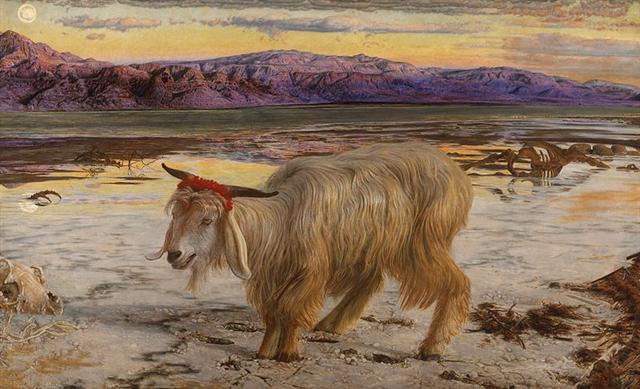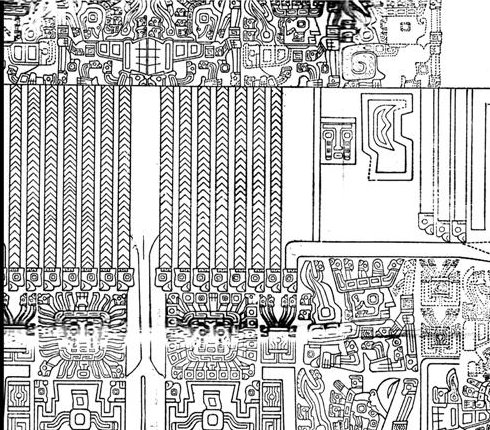When
comparing the C and G texts the bluemarked stars should be our
primary guides. They determined where the Sun was. I have bluemarked
Polaris at the end of the C tablet as a consequence of my assumption
of heliacal stars flowing in an uninterrupted parallel with the
sequence of glyphs from heliacal Algenib Pegasi at Ca1-1.
|
'February 22 (53) |
23 (420) |
24 |
|
March 21 |
22 (81) |
23 |
|
September 20 |
21 |
equinox
(265) |
|
no glyph |
 |
 |
|
Ca1-1 |
Ca1-2 |
|
koia |
ki
te hoea |
|
Al
Fargh al Thāni-25 |
Uttara Bhādrapadā-27
/
Wall-14 |
χ Pegasi
(2.1), θ Andromedae (2.7) |
|
0h
(365.25) |
|
Caph,
SIRRAH
(0.5), ε Phoenicis (0.8) |
ALGENIB PEGASI (1.8)
|
|
Alchita, Ma Wei (183.1),
Minkar (183.7), ρ
Centauri (183.9) |
Pálida (184.6), Megrez
(184.9) |
Hasta-13
/
Chariot-28 |
|
GIENAH (185.1), ε Muscae (185.2), ζ Crucis
(185.4), Zaniah (185.9) |
In Ga6-5, though,
Polaris at Nga Kope Ririva A Taanga has been blackmarked
in order to indicate its position close to the nakshatra Full
Moon face, and therefore also indicating the arrival of spring
on Easter Island.

|
'March
15 |
16 |
17 |
18 (77) |
19 |
20 (445) |
|
April 11 |
12 |
13 |
14 (104) |
15 (471) |
16 |
|
October 11 |
12 (285) |
13 |
14 |
15 |
16 |
 |
 |
 |
 |
 |
 |
|
*Ca14-24 |
*Ca14-25 |
*Ca14-26 |
*Ca14-27 |
*Ca14-28 |
*Ca14-29 |
| te
henua |
te
honu kau |
manu kake rua |
te
henua |
te
honu |
te
rima |
|
δ
Phoenicis (21.5) |
no star
listed (22) |
Achernar
(23.3) |
no star
listed (24) |
no star
listed (25) |
ANA-NIA |
|
POLARIS,
Baten Kaitos (26.6), Metallah (26.9) |
|
no star listed (204) |
Heze (205.0) |
ε Centauri (206.3) |
no star listed (207) |
τ Bootis (208.2),
Benetnash (208.5), ν Centauri (208.7), μ Centauri, υ
Bootis (208.8) |
no star listed (209) |
|
'Equinox
(around 76 B.C.) |
'March
22 (81) |
23 (448) |
|
'September 20 |
21 (264) |
'Equinox |
|
April 17
(107) |
18 |
19 (475) |
|
October
17 (290) |
18 |
19 |
 |
 |
 |
|
Cb1-1
(393) |
Cb1-2 |
Cb1-3 |
|
E tupu - ki roto |
o
te hau tea |
|
Al
Sharatain-1 /
Ashvini-1 /
Bond-16 |
ι Arietis (28.0), λ
Arietis (28.2) |
Alrisha, χ Phoenicis
(29.2), Alamak (29.7) |
|
Segin,
Mesarthim, ψ Phoenicis
(27.2), SHERATAN, φ
Phoenicis (27.4) |
|
Muphrid
(210.1), ζ Centauri (210.3) |
φ
Centauri (211.0), υ¹ Centauri (211.1), υ² Centauri
(211.8), τ Virginis (211.9) |
Agena
(212.1), θ Apodis (212.5), Thuban (212.8) |
|
'March
24 |
|
Bluemarked stars are noted with their RA days in
rongorongo times.
Blackmarked stars
are given with their nakshatra days = heliacal RA
days ± 183. |
|
'September 23 (266) |
|
April 20
(110) |
|
October
20 (293) |
 |
 |
|
Cb1-4 (396) |
Ga6-9
(149) |
| ki
te henua - te maro |
14h
(213.1) |
|
2h
(30.4) |
|
κ Arietis (30.3), Hamal
(30.5)
Alkes
|
π
Hydrae, χ Centauri (213.0), Menkent (213.1) |
|
14h
(213.1) |
Tagaroa
Uri 20 (293) |
|
χ
Centauri (213.0), Menkent (213.1) |
ºOctober
16 (289) |
|
Writing
about C I had not yet realized that the creator of
the text had followed the stars in their
precessional advance forward in the solar year -
instead of follwoing the Sun in his precessional
advance earlier in the star year.
Therefore I had not found any reason to use the
Easter Island names.
October
20 (293) above corresponds to Tagaroa Uri 20 (293)
and to the Gregorian date ºOctober 16 (289), with
the 4 days' difference in the day number due to the
effects of the precession from the time of Gregorius
XIII to rongorongo times. |
'September 23 (266) |
|
"September 9 (*172) |
|
2h
(30.4) |
|
κ Arietis (30.3), Hamal
(30.5)
Alkes
|
|
Vaitu
Nui 20 (110) |
|
ºApril
17 (106) |
|
'March
24 (83) |
|
"March
10 (*355) |
|
Nga Kope
Ririva A Taanga |
 |
 |
 |
|
Ga6-3 |
Ga6-4 (144) |
Ga6-5 |
|
no star
listed (207) |
τ
Bootis (208.2),
Benetnash
(208.5), ν Centauri (208.7), μ Centauri, υ Bootis
(208.8) |
no star
listed (209) |
|
Tagaroa
Uri 14 |
15 (288) |
16 |
|
ºOctober
10 |
11 (*204) |
12 (285) |
|
'September 17 (260) |
18 |
19
(*182) |
|
"September 3 (246) |
4 |
5 (*168) |
|
no star listed (24) |
no star listed (25) |
ANA-NIA |
|
POLARIS, Baten Kaitos (26.6), Metallah
(26.9) |
|
Vaitu
Nui 14 |
15
(*391) |
16 (472) |
|
ºApril 11 (101) |
12
(*387) |
13 (468) |
|
'March 18 (78) |
19
(*364) |
20 (445) |
|
"March 4 (64) |
5 (*350) |
6 (431) |
 |
 |
 |
|
Ga6-6 |
Ga6-7 |
Ga6-8
(148) |
|
Muphrid
(210.1), ζ Centauri (210.3) |
φ
Centauri (211.0), υ¹ Centauri (211.1), υ² Centauri
(211.8), τ Virginis (211.9) |
Agena
(212.1), θ Apodis (212.5), Thuban (212.8) |
|
Tagaroa
Uri 17 (290) |
18 |
19 |
|
ºOctober
13 |
14 |
15 (288) |
|
'September 20 (*183) |
21 (264) |
'Equinox
(*185 + 80) |
|
"September 6 |
7 (250) |
8 (*171) |
|
Al
Sharatain-1 /
Ashvini-1 /
Bond-16 |
ι Arietis (28.0), λ
Arietis (28.2) |
Alrisha, χ Phoenicis (29.2), Alamak (29.7) |
|
Segin,
Mesarthim, ψ Phoenicis
(27.2), SHERATAN, φ
Phoenicis (27.4) |
|
Vaitu
Nui 17 (107) |
18 (474 = 108 + 366) |
19 |
|
ºApril
14 |
15 (104
= 59 + 46) |
16 (*25) |
|
'Equinox
(80 = 59 + 21) |
22
(*367) |
23 (448
= 366 + 82) |
|
"March 7
(432 = 66 + 366) |
8 (67 =
59 + 22) |
9 (*354) |
 |
 |
 |
|
Ga6-9 |
Ga6-10
(150) |
Ga6-11 |
|
14h
(213.1) |
Neck-2 |
Al
Ghafr-13 /
Svāti-15
TAHUA-TAATA-METUA-TE-TUPU-MAVAE |
|
π
Hydrae, χ Centauri (213.0), Menkent (213.1) |
Asellus
Tertius,
κ VIRGINIS,
14 Bootis (214.8) |
15
Bootis (215.2),
ARCTURUS
(215.4), Asellus Secundus (215.5),
SYRMA,
λ Bootis (215.6), η Apodis (215.8) |
|
Tagaroa
Uri 20 |
21 |
22 (295) |
|
ºOctober
16 |
17 (290) |
18 |
|
'September 23 (266) |
24 |
25 (*188) |
|
"September 9 (*172) |
10 |
11 (254) |
|
2h
(30.4) |
η Arietis (31.9) |
no star listed (32) |
|
κ Arietis (30.3), Hamal
(30.5)
Alkes
|
|
Vaitu
Nui 20 |
21 (111) |
22 |
|
ºApril
17 |
18 (107) |
19 (*28) |
|
'March
24 |
25 (84) |
26 (*5) |
|
"March
10 (*355) |
11 (436) |
12 (71 =
31 + 28 + 11) |
214 = 314 -
100 was where in rongorongo times the 2nd Chinese lunar station
Neck, governed by κ Virginis, rose
with the Sun. In the C text this is a very special place:
|
'March 25 |
26 (85) |
27 (452) |
rutua - te
pahu - rutua te maeva - atua rerorero - atua
hiko ura - hiko o tea - ka higa te ao ko te henua ra
ma te hoi atua |
|
'September 24 |
25 (268) |
26 |
|
April 21
(111) |
22 (478) |
23 |
|
October
21 |
22 (295) |
23 |
 |
 |
 |
|
Cb1-5 |
Cb1-6
(398) |
Cb1-7 |
|
η Arietis (31.9) |
no star listed (32) |
θ Arietis (33.3), Mira
(33.7) |
|
Neck-2 |
Al
Ghafr-13 /
Svāti-15
TAHUA-TAATA-METUA-TE-TUPU-MAVAE |
ι Lupi,
18 Bootis (216.3), Khambalia (216.4), υ Virginis
(216.5), ψ Centauri (216.6), ε Apodis (216.8) |
|
Asellus
Tertius,
κ
VIRGINIS,
14 Bootis (214.8) |
15
Bootis (215.2),
ARCTURUS
(215.4), Asellus Secundus (215.5),
SYRMA,
λ Bootis (215.6), η Apodis (215.8) |
|
'March
28 |
29 |
30 (455) |
31 (90) |
|
'September 27 |
28 |
29 |
30 (273) |
|
April 24 |
25 |
26 (116) |
27 |
|
October
24 |
25 |
26 |
27 (300) |
 |
 |
 |
 |
|
Cb1-8 |
Cb1-9 |
Cb1-10 |
Cb1-11 (403) |
|
no star listed (34) |
ξ Arietis (35.0) |
no star listed (36) |
no star listed (37) |
|
Asellus
Primus (217.8) |
τ Lupi
(218.1), φ Virginis (218.7)
Fomalhaut
|
σ Lupi
(219.1), ρ Bootis (219.5), Haris (219.7) |
σ Bootis
(220.2), η Centauri (220.4) |
I tried to
translate rutua - te pahu - rutua te maeva as 'sound of drums
- sound of sky moving'. But in Manuscript E the word rutua
was instead used for describing the powerful sound of the
incantantions of the 10 helpers of the King:
...
Honga came and gazed in the direction below (i.e., toward the
west). He called out to the noteworthy ruler (? ariki motongi)
Hotu: 'There is the canoe of the queen! It will be the first
one to land!' At this news King Hotu replied to Honga,
'Recite (rutu) ('powerful incantations') as though the ten
brothers of the chief (ariki maahu) were one whole (?)'
|
Rutu
1. To read, to recite, to pronounce words
solemnly; he-rutu i te kohau motu, to read the
rongorongo tablets; hare rutu rogorogo mo hakama'a ki te
ga poki ite kai, i te rogorogo, rongorongo school, house
in which children were taught reading and writing the
rongorongo signs. 2. To pelt with stones. 3. To gather in
great numbers (of people). Vanaga.
Sound. Rutu-rongorongo = the sound
of recitation. Barthel.
T. Beat. Henry.
To recite; tae rutu, irreverence.
Churchill.
Pau.: rutu, a drum. Mgv.: rutu,
to beat, to cause to resound. Ta.: rutu, a drum, to
drum. Mq.: utu, to drum. Sa.: lutu, to shake a
rattle. Churchill. |
To gather
in great numbers in order to pelt with stones (stars) - rutua
- could have been a method of getting rid of the 'winter fur' (the
'covering', Al Ghafr):

"The
Hajj is associated with the life of Islamic prophet Muhammad
from the 7th century, but the ritual of pilgrimage to Mecca is
considered by Muslims to stretch back thousands of years to the time
of Abraham. During Hajj, pilgrims join processions of
hundreds of thousands of people, who simultaneously converge on
Mecca for the week of the Hajj, and perform a series of
rituals: each person walks counter-clockwise seven times around the
Ka'aba (the cube-shaped building and the direction of prayer
for the Muslims), runs back and forth between the hills of
Al-Safa and Al-Marwah, drinks from the Zamzam
Well, goes to the plains of Mount Arafat to stand in
vigil, spends a night in the plain of Muzdalifa, and performs
symbolic stoning of the devil by throwing stones at three pillars.
The pilgrims then shave their heads, perform a ritual of animal
sacrifice, and celebrate the three day global festival of Eid
al-Adha ... The days of Eid have been singled out in the
Hadith as 'days of remembrance' [i.e., 'not forgotten' -
kai viri kai viri.]." (Wikipedia)
... The canoe reached the
islets (off the coast), and Ira saw that there were three
such islets. Ira said, 'Hey you, crew of young men, the
vision of Hau Maka, our father, which he revealed to me, has
come true. There are 'the handsome sons of Te Taanga, who are
standing in the water', for this is the name that the dream soul of
Hau Maka gave them. Unforgotten (? kai viri kai viri)
are they, these three. And therefore this is the (right) land lying
there; this is Te Pito O Te Kainga, which also received its
name from the dream soul.' (Manuscript E p. 17.)
215 + 185 =
400 is the approximate number carefully hidden among the tresses of
Pachamama (the Earth Mother):

Counting to
185 may have begun when Hotu Matua came with his summer to
Easter Island. 288 (Tagaroa Uri 15) + 185 = 473 (= 16 * 29½ + 1).
Counted
from January 1 there were 215 days to heliacal Arcturus in Tagaroa
Uri 22.
Tagaroa Uri 22 - Tagaroua Uri 15 = 7 and 185 + 7 = 192 = 384
/ 2. Counting counterclockwise seven (times around the
Ka'aba) we will reach 215 + 7 + 185 = 407:
|
March 20 |
Equinox |
22
(81) |
23 |
61 |
1 |
119 |
Sept
21 |
Equinox |
 |
 |
 |
 |
 |
 |
|
Gb6-25 (407) |
Gb6-26 (0h) |
Gb6-27 (*1) |
Gb6-28 |
181 |
Ga5-10 |
Ga5-11 |
|
no
star listed (364) |
Al
Fargh al Thāni-25 |
Uttara Bhādrapadā-27
/
Wall-14 |
χ
Pegasi (2.1), θ Andromedae (2.7) |
|
Pálida (184.6), Megrez (184.9) |
Hasta-13 /
Chariot-28 |
|
Caph,
SIRRAH
(0.5), ε Phoenicis (0.8) |
ALGENIB PEGASI
(1.8)
|
GIENAH
(185.1), ε Muscae (185.2), ζ Crucis (185.4),
Zaniah (185.9) |
|
ºMarch 16 |
17
(*360) |
18 (77) |
19 |
181 |
ºSept 17 |
18 (261) |
|
'Febr21 (52) |
22 |
Terminalia |
Bissextum |
'Aug 25 (237) |
26
(*158) |
|
"February 7 |
8
(*324) |
9
(40) |
10 |
"Aug11 (*143) |
12
(224) |
|
Tehetu'upú 20 |
21
(80) |
185 |
|
























